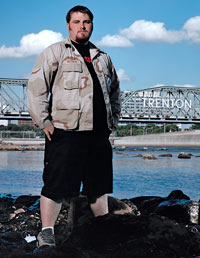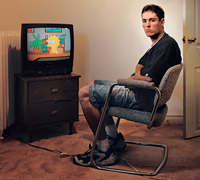
Photographs by: Jeff Reidel
MIKE HOFFMAN would not be the guy his buddies would expect to see leading a protest movement. The son of a steelworker and a high school janitor from Allentown, Pennsylvania, he enlisted in the Marine Corps in 1999 as an artilleryman to “blow things up.” His transformation into an activist came the hard way—on the streets of Baghdad.
When Hoffman arrived in Kuwait in February 2003, his unit’s highest-ranking enlisted man laid out the mission in stark terms. “You’re not going to make Iraq safe for democracy,” the sergeant said. “You are going for one reason alone: oil. But you’re still going to go, because you signed a contract. And you’re going to go to bring your friends home.” Hoffman, who had his own doubts about the war, was relieved—he’d never expected to hear such a candid assessment from a superior. But it was only when he had been in Iraq for several months that the full meaning of the sergeant’s words began to sink in.
“The reasons for war were wrong,” he says. “They were lies. There were no WMDs. Al Qaeda was not there. And it was evident we couldn’t force democracy on people by force of arms.”
When he returned home and got his honorable discharge in August 2003, Hoffman says, he knew what he had to do next. “After being in Iraq and seeing what this war is, I realized that the only way to support our troops is to demand the withdrawal of all occupying forces in Iraq.” He cofounded a group called Iraq Veterans Against the War (IVAW) and soon found himself emerging as one of the most visible members of a small but growing movement of soldiers who openly oppose the war in Iraq.
Dissent on Iraq within the military is not entirely new. Even before the invasion, senior officers were questioning the optimistic projections of the Pentagon’s civilian leaders, and several retired generals have strongly criticized the war. But now, nearly two years after the first troops rolled across the desert, rank-and-file soldiers and their families are increasingly speaking up. Hoffman’s group was founded in July with 8 members and had grown to 40 by September. Another organization, Military Families Speak Out, began with 2 families two years ago and now represents more than 1,700 families. And soldier-advocacy groups are reporting a rising number of calls from military personnel who are upset about the war and are thinking about refusing to fight; a few soldiers have even fled to Canada rather than go to Iraq.
In a 2003 Gallup Poll, nearly one-fifth of the soldiers surveyed said they felt the situation in Iraq had not been worth going to war over. In another poll, in Pennsylvania last August, 54 percent of households with a member in the military said the war was the “wrong thing to do”; in the population as a whole, only 48 percent felt that way. Doubts about the war have contributed to the decline of troop morale over the past year—and may, some experts say, be a factor in the 40 percent increase in Army suicide rates in Iraq in the past year. “That’s the most basic tool a soldier needs on the battlefield—a reason to be there,” says Paul Rieckhoff, a platoon leader in the New York National Guard and former JPMorgan banker who served in Iraq. Rieckhoff has founded a group called Operation Truth, which provides a freewheeling forum for soldiers’ views on the war. “When you can’t articulate that in one sentence, it starts to affect morale. You had an initial rationale for war that was a moving target. [But] it was a shell game from the beginning, and you can only bullshit people for so long.”
With his baggy pants, red goatee, and moussed hair, Mike Hoffman looks more like a guy taking some time off after college than a 25-year-old combat veteran. But the urgency in his voice belies his relaxed appearance; he speaks rapidly, consumed with the desire to get his point across. As we talk at a coffee shop in Vermont after one of his many speaking engagements, he concedes, “A lot of what I’m doing is basically survivor’s guilt. It’s hard: I’m home. I’m fine. I came back in one piece. But there are a lot of people who haven’t.”
More than a year after his return from Iraq, Hoffman is still battling depression, panic attacks, and nightmares. “I don’t know what I did,” he says, noting that errors and faulty targeting were common in the artillery. “I came home and read that six children were killed in an artillery strike near where I was. I don’t really know if that was my unit or a British unit. But I feel responsible for everything that happened when I was there.”
When he first came home, Hoffman says, he tried to talk to friends and family about his experience. It was not a story most wanted to hear. “One of the hardest things when I came back was people who were slapping me on the back saying ‘Great job,’” he recalls. “Everyone wants this to be a good war so they can sleep at night. But guys like me know it’s not a good war. There’s no such thing as a good war.”
Hoffman finally found some kindred spirits last fall when he discovered Veterans For Peace, the 19-year-old antiwar group. Older veterans encouraged him to speak at rallies, and steadily, he began to connect with other disillusioned Iraq vets. In July, at the Veterans For Peace annual meeting in Boston, Hoffman announced the creation of Iraq Veterans Against the War. The audience of silver-haired vets from wars in Vietnam, Korea, and World War II exploded into applause. Hoffman smiles wryly. “They tell us we’re the rock stars of the antiwar movement.”
Several of Hoffman’s Marine Corps buddies have now joined Iraq Veterans Against the War, and the stream of phone calls and emails from other soldiers is constant. Not long ago, he says, a soldier home on leave from Iraq told him, “Just keep doing what you’re doing, because you’ve got more support than you can imagine over there.”
Members of IVAW led the protest march that greeted the Republican convention in New York, and their ranks swelled that week. But the protest’s most poignant moment came after the march, as veterans from wars past and present retreated to Summit Rock in Central Park. Joe Bangert, a founding member of Vietnam Veterans of America, addressed the group. “One of the most painful things when we returned from Vietnam was that the veterans from past wars weren’t there for us,” he said. “They didn’t support us in our questioning and our opposition to war. And I just want to say,” he added, peering intently at the younger veterans, “we are here for you. We have your back.”
There was no Iraq veterans’ group for Brandon Hughey to turn to in December 2003. Alone and terrified, sitting in his barracks at Fort Hood, Texas, the 18-year-old private considered his options. He could remain with his Army unit, which was about to ship out to Iraq to fight a war that Hughey was convinced was pointless and immoral. Or he could end his dilemma—by taking his own life.
 |
|
Army private Brandon Hughey is one of six U.S. soldiers seeking refugee status in Canada. |
Desperate, Hughey trolled the Internet. He emailed a peace activist and Vietnam veteran in Indianapolis, Carl Rising-Moore, who made him an offer: If he was serious about his opposition to the war, Rising-Moore said, he would help him flee to Canada.
The next day, there was a knock on Hughey’s door: His deployment date had been moved up, and his unit was leaving within 24 hours. Hughey packed his belongings in a military duffel, jumped in his car, and drove north. As he and Rising-Moore approached the Rainbow Bridge border post at Niagara Falls, Hughey was nervous and somber. “I had the sense that once I crossed that border, I might never be able to go back,” he recalls. “It made me sad.”
Months after fleeing Fort Hood, the baby-faced 19-year-old still sports a military-style buzz cut. Sitting at the kitchen table of the Quaker family that is sheltering him in St. Catharines, Ontario, Hughey tells me about growing up in San Angelo, Texas, where he was raised by his father. In high school he played trumpet and loved to soup up cars. But when his father lost his job as a computer programmer, he was forced to use up his son’s college fund. So at 17, Hughey enlisted in the Army, with a $5,000 signing bonus to sweeten the deal.
Quiet and unassuming, Hughey grows intense when the conversation turns to Iraq. “I would fight in an act of defense, if my home and family were in danger,” he says. “But Iraq had no weapons of mass destruction. They barely had an army left, and Kofi Annan actually said [attacking Iraq was] a violation of the U.N. charter. It’s nothing more than an act of aggression.” As for his duty to his fellow soldiers, he insists, “You can’t go along with a criminal activity just because others are doing it.”
So far, only six U.S. soldiers are known to have fled to Canada rather than fight in Iraq. But in 2003, the Army listed more than 2,774 soldiers as deserters (military personnel are classified as having deserted after not reporting for duty for more than a month), and many observers believe the actual number may be even higher; the Army has acknowledged that it is not aggressively hunting down soldiers who don’t show up. The GI Rights Hotline, a counseling operation run by a national network of antiwar groups, reports that it now receives between 3,000 and 4,000 calls per month from soldiers seeking a way out of the military. Some of the callers simply never thought they would see combat, says J.E. McNeil, director of the Center on Conscience and War. But others are turning against the war because of what they saw while serving in Iraq, and they don’t want to be sent back there. “It’s people learning what war really is,” she says. “A lot of people are naive—and for a while, the military was portraying itself as being a peace mission.”
Unlike Vietnam, when young men facing the draft could convincingly claim that they opposed all war, enlistees in a volunteer military have a tough time qualifying as conscientious objectors. In the Army, 61 soldiers applied for conscientious objector status last year, and 31 of those applications were granted. “The Army does understand people can have a change of heart,” notes spokeswoman Martha Rudd. “But you can’t ask for a conscientious objector discharge based on moral or religious opposition to a particular war.”
Staff Sergeant Jimmy Massey may be the most unlikely of the soldiers who have come out against the war. A Marine since 1992, he has been a recruiter, infantry instructor, and combat platoon leader. He went to Iraq primed to fight. “9/11 pissed me off,” he says. “I was ready to go kill a raghead.”
 |
|
Jimmy Massey went to Iraq a gung-ho Marine, but returned shaken after killing civilians. |
Shortly after Massey arrived in Iraq, his unit was ordered to man roadblocks. To stop cars, the Marines would raise their hands. If the drivers kept going, Massey says, “we would just light ’em up. I didn’t find out until later on, after talking to an Iraqi, that when you put your hand up in the air, it means ‘Hello.’” He estimates that his men killed 30 civilians in one 48-hour period.
One day, he recalls, “there was this red Kia Spectra. We told it to stop, and it didn’t. There were four occupants. We fatally wounded three of them. We started pulling out the bodies, but they were dying pretty fast. The guy that was driving was just frickin’ bawling, sitting on the highway. He looked at me and asked, ‘Why did you kill my brother? He wasn’t a terrorist. He didn’t do anything to you.’”
Massey searched the car. “It was completely clean. Nothing there. Meanwhile the driver just ran around saying, ‘Why? Why?’ That’s when I started to question.”
The doubts led to nightmares, depression, and a talk with his commanding officer. “I feel what we are doing here is wrong. We are committing genocide,” Massey told him. He was later diagnosed with post-traumatic stress disorder and given a medical discharge.
Back in his hometown of Waynesville, North Carolina, Massey got a job as a furniture salesman, then lost it after speaking at an antiwar rally. Two or three times a week, he puts on his Marine uniform and takes a long walk around the nearby town of Asheville carrying a sign that reads: “I killed innocent civilians for our government.” The local police now keep an eye out for him, he says, because people have tried to run him over.
When asked what he would say to someone who thinks the way he did before the war, Massey falls uncharacteristically silent. “How do you wake them up?” he finally responds. “It’s a slow process. All you can do is tell people the horrible things you’ve seen, and let them make up their own minds. It’s kind of the pebble in the water: You throw in a pebble, and it makes ripples through the whole pond.”
Jeffry House is reliving his past. An American draft dodger who fled to Canada in 1970 (he was number 16 in that year’s draft lottery), he is now fighting to persuade the Canadian government to grant refugee status to American deserters.
“In some ways, this is coming full circle for me,” says the slightly disheveled, 57-year-old lawyer. “The themes that I thought about when I was 21 years old now are reborn, particularly your obligation to the state when the state has participated in a fraud, when they’ve deceived you.” A dormant network has been revived, with Vietnam-era draft dodgers and deserters quietly contributing money to support the legal defense of the newest American fugitives.
House’s strategy is bold: He is challenging the very legality of the Iraq war, based on the Nuremberg principles. Those principles, adopted by a U.N. commission after World War II in response to the Nazis’ crimes, hold that military personnel have a responsibility to resist unlawful orders. They also declare wars of aggression a violation of international law. House hopes that in Canada, which did not support the war in Iraq, courts might sympathize with the deserters’ claims and grant them legal refugee status; the first of his cases was to be heard by the Canadian Immigration and Refugee Board this fall.
On an August afternoon, I follow House as he darts through Toronto traffic on his way to see a new client—a young American who had been living in a homeless shelter for 10 months before revealing that he was on the run from the U.S. Navy. He disappears into a run-down brown brick building; moments later, a thin, nervous young man in shorts and a T-shirt emerges onto the sidewalk and introduces himself as Dave Sanders. Over dinner at a nearby Pizza Hut, he tells me his story.
Sanders dropped out of 11th grade in Bullhead City, Arizona, in 2001. He got his GED and was hoping to study computers, but couldn’t get financial aid. “The only reason I joined the military was to go to college,” he says. That was late 2002, and I ask Sanderswhether he then considered he might end up in combat. “I was told,” he says, “that everything would be ended by the time I got out of boot camp.”
 |
|
Dave Sanders, age 20, left his Navy unit because he felt that Iraq was “a very unjust war.” |
Sanders completed boot camp in March 2003, two days before the United States began bombing Iraq. He started training as a cryptologist; in his spare time he surfed the web, reading news from the BBC and Al Jazeera. He was growing skeptical of the administration’s motives in Iraq. “Stuff wasn’t adding up,” he recalls. “Bush was trying to connect the terrorists with Iraq, and there was no proof for that. I was starting to think that we kind of put the blame on Iraq so we could go over there and make money for companies.” He considered what his job might be if he were deployed; as a cryptologist, he could have been handling information leading to raids and arrests. “I didn’t want to be a part of putting innocent people in prison,” he says. “I felt that what we were doing there was wrong.”
In October 2003, Sanders learned that his unit was headed to Iraq. For several weeks he agonized over what to do; then he bought a one-way Greyhound ticket and headed to Toronto. He picked up odd jobs and kept quiet about his predicament, fearing that authorities might send him back to the United States. Finally, he read an article about Jeremy Hinzman, another deserter who had fled to Canada and was being represented by Jeffry House. When I spoke to Sanders, House was helping him file for refugee status.
As we talk, Sanders keeps tapping his feet and twisting his long fingers. “Sorry if I seem nervous,” he finally blurts. “I never really talked to the media before. I’m a shy person.” I ask if he surprised himself by defying his orders. He nods. “I never really thought I could stand up to a whole institution.”
Though Sanders has kept away from the spotlight, other deserters have attracted headlines around the world—and drawn criticism from the war’s supporters. Fox’s Bill O’Reilly called their actions “insulting to America, and especially to those American soldiers who have lost their lives fighting terrorists.”
But Sanders says he doesn’t actually consider himself a deserter. “I don’t think I did anything wrong by turning down an illegal order,” he says. “I don’t know what it’s called—I think it’s Nuremberg?—that’s what I followed by leaving.” When I ask if he would call himself a pacifist, he says he is not sure what the term means and asks me to explain. Then he shakes his head. “I believe if you’re being attacked you have a right to defend yourself. But right now, we are not the ones being attacked. That’s a reason I think this is a very unjust war.”
Sanders is an only child; his father served in the Marines for 13 years. “My family is pro-war, pro-Bush, pro-everything that’s happening,” he says. “They would really not support what I’m doing.” He has emailed them to tell them that he’s alive, but they have not replied. “I miss them,” he says, his eyes welling. “I love them. And I hope they can find it in their hearts to forgive me.”
Sergeant John Bruhns is sharply critical of soldiers who go AWOL. “I feel that if you are against the war, you should be man enough to stay put and fight for what you believe in,” he says. But he also doesn’t believe in making a secret of his opinions about the war. “I’m very proud of my military service,” he tells me from his post with the Army’s 1st Armored Division in Fort Riley, Kansas. “But I am disheartened and personally hurt, after seeing two people lose their limbs and a 19-year-old girl die and three guys lose their vision, to learn that the reason I went to Iraq never existed. And I believe that by being over there for a year, I have earned the right to have an opinion.”
Bruhns returned in February from a one-year deployment in Iraq. He is due to complete his Army service next March, but his unit may be “stop-lossed”—their terms extended beyond their discharge dates to meet the Pentagon’s desperate need for troops. Critics have called this a backdoor draft, a way to force a volunteer military into involuntarily serving long stints in an unpopular war. A California National Guard member has filed a lawsuit challenging the policy, and Bruhns has considered joining the case.
“I’m really a patriotic soldier,” the 27-year-old infantryman tells me; he addresses me as “sir” and stops periodically to answer the squawk of his walkie-talkie. He signed up as a full-time soldier in early 2002, after serving five years in the Marine Corps Reserve. “I was really upset about what happened on 9/11,” he recalls, “and I really wanted to serve. I lost a buddy of mine in the World Trade Center. I believe what we did in Afghanistan was right.”
But what he saw in Iraq, Bruhns says, left him disappointed. “We were fighting all the time. The only peace is what we kept with guns. A lot of stuff that we heard on the news—that we were fighting leftover loyalists, Ba’ath Party holdovers—wasn’t true. When I arrested people on raids, many of them were poor people. They weren’t in with the Ba’ath Party. The people of Iraq were attacking us as a reaction to what the majority of them felt—that they were being occupied.”
Among his fellow soldiers, Bruhns adds, a majority still support the war. But, he notes, “This is a new generation. We have the Internet, discussion forums, cable news. Soldiers don’t just march off into battle blindly anymore. They have a lot more information.”
Vietnam figures prominently in soldiers’ conversations about Iraq. Nearly every one of the Iraq veterans I spoke with has relatives who served in the military, and nearly every one told me the same story: When they grew cynical about the Iraq war, the Vietnam veterans in their family immediately recognized what was happening—that another generation of soldiers was grappling with the realization that they were being sent to carry out a policy determined by people who cared little for the grunts on the ground.
Resistance in the military “is in its infancy right now,” says Hoffman, whose cousins, uncle, and grandfather all did their time in uniform. “It’s growing, but it’s going to take a little while.
“There was a progression of thought that happened among soldiers in Vietnam. It started with a mission: Contain communism. That mission fell apart, just like it fell apart now—there are no weapons of mass destruction. Then you are left with just a survival instinct. That, unfortunately, turned to racism. That’s happening now, too. Guys are writing me saying, ‘I don’t know why I’m here, but I hate the Iraqis.’
“Now, you realize that the people to blame for this aren’t the ones you are fighting,” Hoffman continues. “It’s the people who put you in this situation in the first place. You realize you wouldn’t be in this situation if you hadn’t been lied to. Soldiers are slowly coming to that conclusion. Once that becomes widespread, the resentment of the war is going to grow even more.”















